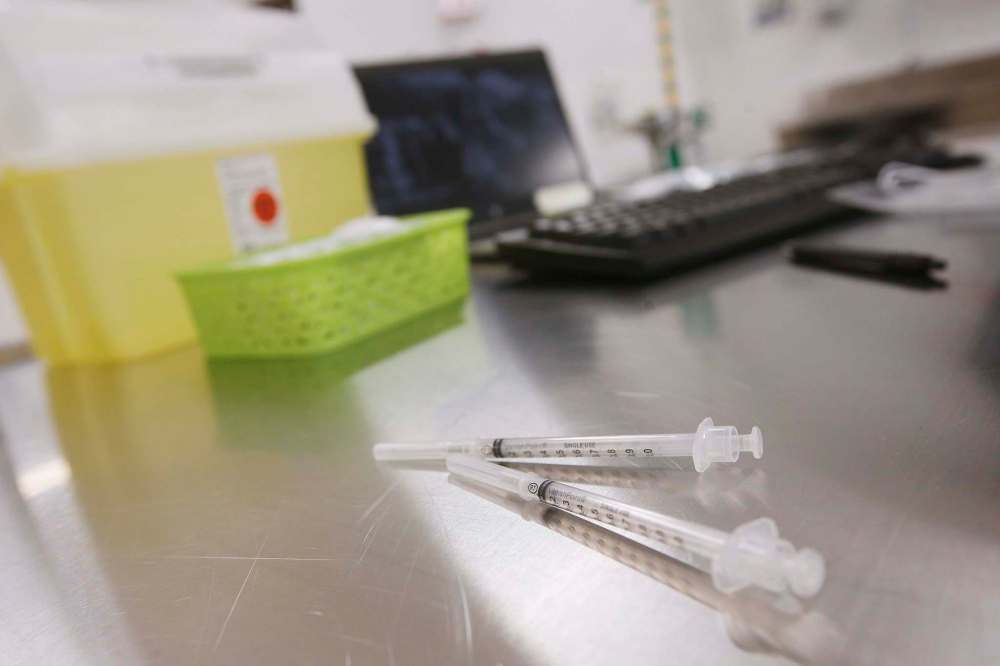Caution is priority when easing restrictions
Read this article for free:
or
Already have an account? Log in here »
To continue reading, please subscribe:
Monthly Digital Subscription
$0 for the first 4 weeks*
- Enjoy unlimited reading on winnipegfreepress.com
- Read the E-Edition, our digital replica newspaper
- Access News Break, our award-winning app
- Play interactive puzzles
*No charge for 4 weeks then price increases to the regular rate of $19.00 plus GST every four weeks. Offer available to new and qualified returning subscribers only. Cancel any time.
Monthly Digital Subscription
$4.75/week*
- Enjoy unlimited reading on winnipegfreepress.com
- Read the E-Edition, our digital replica newspaper
- Access News Break, our award-winning app
- Play interactive puzzles
*Billed as $19 plus GST every four weeks. Cancel any time.
To continue reading, please subscribe:
Add Free Press access to your Brandon Sun subscription for only an additional
$1 for the first 4 weeks*
*Your next subscription payment will increase by $1.00 and you will be charged $16.99 plus GST for four weeks. After four weeks, your payment will increase to $23.99 plus GST every four weeks.
Read unlimited articles for free today:
or
Already have an account? Log in here »
Hey there, time traveller!
This article was published 14/01/2021 (1793 days ago), so information in it may no longer be current.
Manitoba hit a milestone this week: for the first time since mid-October, the daily number of new cases of COVID-19 fell below 100 on Tuesday.
That wasn’t the only good news: the province’s test positivity rate also declined, from highs above 14 per cent in November to less than 10 per cent this week.
Despite an increase in gatherings at private residences over the holidays, Manitoba did not see a major spike in cases during the two-week incubation period that followed.
Declining case numbers have provided hospitals with some relief, including fewer COVID-19 patients in intensive-care units. The number of major outbreaks at personal-care homes has also fallen dramatically.
Manitoba’s improved circumstances are in stark contrast to deteriorating conditions in other parts of Canada, where case numbers and hospitalizations are soaring. Governments in Ontario and Quebec have imposed fresh rounds of restrictions on individuals and businesses.

The question for Manitoba is: what restrictions — if any — should be lifted once current orders expire on Jan. 22? Manitobans know all too well the dangers of reopening the economy too soon and letting their guards down prematurely. Combined with a woeful lack of preparedness by the provincial government in areas such as testing, contact tracing and the protection of personal-care homes, complacency in the fall led to record caseloads, hospital overcrowding and the second highest COVID-19 deaths per capita in Canada.
It’s a mistake Manitoba must not repeat.
However, the financial hardship on those disproportionately affected by the province’s code-red restrictions cannot be ignored. Many small-business owners and not-for-profits have been devastated by public-health interventions. Some have lost their livelihoods; others are on the brink of bankruptcy.
Any adjustment should be done slowly and carefully.
The province has provided some supports. However, Premier Brian Pallister has been hesitant to adequately compensate those most affected. Support programs have been limited and slow to materialize; they’ve fallen well short of preventing bankruptcies or near financial ruin.
Dr. Brent Roussin, Manitoba’s chief provincial public health officer, has spoken often about the need to strike the right balance between protecting Manitobans against the virus and mitigating harm caused by government interventions. As case numbers fall and hospital capacity improves, that balance should be reassessed.
If infection rates continue to fall as Jan. 22 approaches, there may be room to loosen restrictions. Some small businesses could be allowed to reopen with limited capacity, as long as they do so safely and in accordance with strict public-health measures (such as mask wearing, hand sanitizing and social distancing).

If restrictions within the province are eased, consideration should be given to maintaining or reimposing restrictions and self-quarantine requirements on travel to and from more seriously afflicted regions.
Any adjustment should be done slowly and carefully. Removing measures only to reinstate them a few weeks later would be disruptive and would undermine confidence in public-health orders.
What the province should not do is bow to the demands of a small minority of businesses that have been fined in recent days for violating public-health orders, including a tattoo parlour in Winnipeg that reopened in contravention of provincial regulations. Restrictions only work when everyone buys in. While the businesses’ frustration is understandable, defiance is a fruitless and unacceptable response.
Manitoba is still months away from immunizing enough people to safely open large segments of the economy. Until then, everyone — including business owners — must hang on a little longer.
Easing some restrictions would provide struggling businesses with much-needed relief. It would also give Manitobans a morale boost at a time when they sorely need one.








